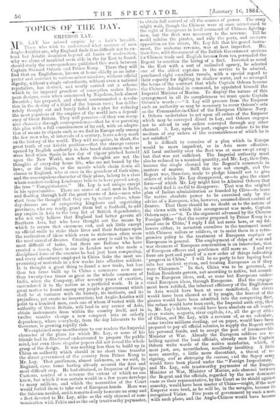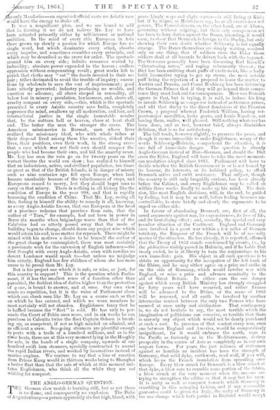TOPICS OF THE DAY.
EMPEROR LAX.
We explained some months since to our readers the Imperial character of the plans for which Mr. Lay, or some of his friends had in Blackwood endeavoured to prepare the public mind, but even those singular papers did not reveal the whole grasp of the design. It was nothing less than to build up in China an authority which should in no short time transfer the direct government of the country from Prince Kuno.° to Mr. Lay. That gentleman, almost unknown, as we said, in England, came home having already secured the first and most difficult step. He had obtained, as Inspector of Foreign Customs, control of a revenue the extent of which no one knew, but which it was certain would in a few years develope to many millions, and which the necessities of the Court would forbid them to take out of European hands. Here was the fulcrum needed, and it remained only to secure an army and a fleet devoted to Mr. Lay, alike as the only channel of com- munication with Pekin and as the only trustworthy paymaster, to obtain full control of all the sources of power. The army might wait, though the Chinese were at once accustomed to the sight of Europeans in local command of Chinese fighting- men, but the fleet was necessary to the revenue. Till he eould subdue the pirates, and rule the ports, and overawe opposition on the rivers, Mr. Lay felt that his grand instru- ment, the seaborne revenue, was at best imperfect. He, therefore, with the consent of the British Government anxious for Chinese trade and English income from tea, persuaded the Regent to sanction the hiring of a fleet. Invested as usual in the East with a sort of unlimited agency, he selected one of the ablest captains in the service to be admiral, purchased eight excellent vessels, with a special regard to their capacity for fighting in shallow water, and so arranged the terms of the contract that while Captain Osborn became the Chinese Admiral in command, he appointed himself the Imperial Minister of Marine. To display the nature of this arrangement in all its completeness we must quote Captain Osborn's words :—" 3. Lay will procure from the Emperor such an authority as may be necessary to cover Osborn's acts as the Commander-in-Chief of the European Chinese Navy. 4. Osborn undertakes to act upon all orders of the Emperor which may be conveyed direct to Lay, and Osborn engages not to attend to any orders conveyed through any other channel. 5. Lay, upon his part, engages to refuse to be the medium of any orders of the reasonableness of which he is, not satisfied."
It is difficult to conceive of a plan which in Europe would be more impudent, or in Asia more effective. All local authority over the fleet was at once swept away ; but that was not sufficient. The Imperial authority must also be reduced to a nominal quantity, and Mr. Lay, therefore, became the single channel for the Regent's commands in matters of marine. Still this was not enough, and the Regent was, therefore, made to pledge himself not to give orders of which Mr. Lay disapproved, or—to give the exact form—of which Mr. Lay might hint to Admiral Osborn that he would find it useful to disapprove. That was the original plan of Indian administration as founded by Clive—to leave the native absolute power to be exercised only by the advice of a European, who, however, assumed direct control of finance. That there should be no doubt as to the nature of the views with which this arrangement was made, Captain Osborn says :—" 6. To the argument advanced by the Chinese Foreign Office that the course proposed by Prince Kung is a usual one in China,' I reply I did not come here, or my fol- lowers either, to accustom ourselves to the treatment usual with Chinese sailors or soldiers, or to assist them in a retro- gressive policy in the treatment of European earp/oyjs or Europeans in general. The employment of ships of war and war steamers of European construction is an innovation, that of European officers and gentlemen still more so. I and my force are part and parcel of a new order of things indicating progress in China.' I will be no party to her lapsing back into her ancient system, and treating Europeans as if they were Chinamen." In fact, China was to be governed, as Indian Residents govern, not according to native, but accord- ing to European ideas, and, as none but Europeans under- stand European ideas, through Europeans. Had the engage- ment been ratified, the inherent efficiency of the Englishman in Asia would have been at once manifested, the rivers would have been cleared as if by magic, the bravest of the pirates would have been admitted into the conquering fleet, the refuse would have been sunk, the Imperial authority, that is, Mr. Lay's letters, would have been absolute on all coasts, river waters, seaports, river capitals, i.e., all the great cities of China, and Mr. Lay, with a revenue of, as we calculate, some twelve millions sterling, not on paper, would have been prepared to pay all official salaries, to supply the Regent with his personal funds, and to accept the post of irremovv.ble Minister at War. Already the European soldiers are re- belling against the local officials, already men like Captain Osborn write words of the native mandarins, which, if most just, are, nevertheless, needlessly insulting. A. little more anarchy, a little more discontent, a threat of re- signing, and so destroying the revenue, r nd the Sepoy army would have been placed under the "Foreign Inspectorate," and Mr. Lay, sole trustworthy paymaster of the Empire, Minister at War, Minister of Marine, sole channel between the Regent and the officials, regarded by the new dominant caste as their representative, by the Court as its shield against anarchy, -would have been master of China—might, if the new Emperor were bred, as he will be, in the seraglio, become its recognized Vizier. Five years of government by such a man, with such plan; and the Anglo-Chinese would have become
e only Mandarins—an organized official caste no Asiatic race' would have the energy to shake off.
It was a magnificent plan, and we are bound to add that in framing it we do not believe Mr. Lay to have been actuated primarily either by self-interest or national ambition. In the mind of every able European in Asia there grows up slowly a passion for which Europe has no single word, but which dominates every other, absorbs every impulse, and sometimes crumbles every principle, and which may be described as the crave for order. The spectacle around him on every side ; infinite resources wasted by imbecility; absolute power expended in the harem ; endless oppression without compensating result; great works left to perish that clerks may " eat " the funds devoted to their re- pair ; tribes decimated to avoid the trouble of inquiry; execu- tions by wholesale to save the cost of imprisonment; good laws utterly perverted; industry producing no wealth, and exertion no advance; all above steeped in sensuality, all below lost in misery ; peculation, lawlessness, and, above all, cruelty rampant on every side,—this, which is the spectacle presented in every Asiatic country save India, completely engrosses the mind, swallows up all moderation, and fear, and international justice in the single immutable resolve that, be the outturn hell or heaven, chaos at least shall end. The better the man the stronger the crave. The American missionaries in Burmah, men whose lives realized the missionary ideal, who with whole tribes at their disposal lived among them like ascetics, risked their lives, their positions, even their work, in the strong crave that a race which was not their own should conquer the people who had become their own, and bid the anarchy cease. Mr. Lay has seen the ruin go on for twenty years on the vastest theatre the world can show ; has realized to himself that an industrious, active, and civilized population, ten times as great as that of the British Islands, is in danger of misery such as nine centuries ago fell upon Europe, when land became unsaleable because of the valuelessness of crops, and Europeans ceased to marry, lest they should beget sons to carry on that misery. There is nothing in all history like the condition of Europe in the year 998, and that is rapidly becoming the condition of China. That Mr. Lay, seeing all this, feeling in himself the ability to remedy it all, knowing, as every Anglo-Asiatic knows, that one European at the head of a province redeems that province from ruin, that the author of " Tara," for example, had not been in power in Berar six months when brigandage worse than that of the Calabrias had so utterly passed away that the mode of building began to change, should deem any project wise which would attain his end, is no matter for reproach. There might be mixed with his motives a desire to be himself the author of the great change he contemplated, there was most certainly a passionate wish for the extension of English influence—the first thought with every Anglo-Asiatic, even with rowdies no decent Londoner would speak to—but unless we misjudge him utterly, England has few children of whom she has more cause to be proud than Mr. Lay.
But is his project one which it is safe, or wise, or just, for this country to support ? This is the question which Parlia- ment, if it has the smallest sense of a function other than parochial, the feeblest idea of duties higher than the protection of prae, is bound to answer, and at once. Our own view needs no repetition, but it is the voice of Parliament alone which can check men like Mr. Lay on a course such as that on which he has entered, and which we warn members he most certainly will not abandon. Englishmen fancy that he is baffled because the "fleet" is sold. He has only to per- suade the Court of Pekin once more, and in six weeks he can purchase in Calcutta twice the fleet Captain Osborn is break- ing up, as competent, if not as high minded an admiral, and as efficient a crew. Sea-going steamers are plentiful enough in ports with a trade of a hundred millions, and as to the river boats, there are at this very moment lying in the Hooghly for sale, in the hands of a single company, upwards of one hundred swift iron steamers, specially constructed to ascend the rapid Indian rivers, and worked by locomotives instead of marine engines. We venture to say that a line of sanction from Prince Kung would in thirteen weeks bring to Shanghai a better fleet than that the sale of which at this moment irri- tates Englishmen, who think all the while they are not wishing for conquest.































 Previous page
Previous page